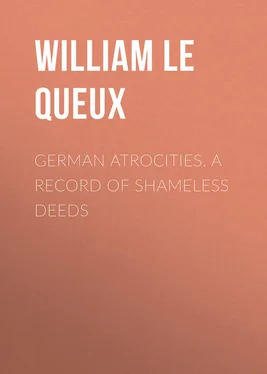William Le Queux - German Atrocities. A Record of Shameless Deeds
Здесь есть возможность читать онлайн «William Le Queux - German Atrocities. A Record of Shameless Deeds» — ознакомительный отрывок электронной книги совершенно бесплатно, а после прочтения отрывка купить полную версию. В некоторых случаях можно слушать аудио, скачать через торрент в формате fb2 и присутствует краткое содержание. ISBN: , Жанр: foreign_language, foreign_prose, на английском языке. Описание произведения, (предисловие) а так же отзывы посетителей доступны на портале библиотеки ЛибКат.
- Название:German Atrocities. A Record of Shameless Deeds
- Автор:
- Жанр:
- Год:неизвестен
- ISBN:http://www.gutenberg.org/ebooks/52082
- Рейтинг книги:3 / 5. Голосов: 1
-
Избранное:Добавить в избранное
- Отзывы:
-
Ваша оценка:
- 60
- 1
- 2
- 3
- 4
- 5
German Atrocities. A Record of Shameless Deeds: краткое содержание, описание и аннотация
Предлагаем к чтению аннотацию, описание, краткое содержание или предисловие (зависит от того, что написал сам автор книги «German Atrocities. A Record of Shameless Deeds»). Если вы не нашли необходимую информацию о книге — напишите в комментариях, мы постараемся отыскать её.
German Atrocities. A Record of Shameless Deeds — читать онлайн ознакомительный отрывок
Ниже представлен текст книги, разбитый по страницам. Система сохранения места последней прочитанной страницы, позволяет с удобством читать онлайн бесплатно книгу «German Atrocities. A Record of Shameless Deeds», без необходимости каждый раз заново искать на чём Вы остановились. Поставьте закладку, и сможете в любой момент перейти на страницу, на которой закончили чтение.
Интервал:
Закладка:
It was the Kaiser (addressing his troops in June, 1900, on their setting out for Peking) who said: —
“ When you meet the foe you will defeat him. No quarter will be given, no prisoners will be taken. Let all who fall into your hands be at your mercy. Gain a reputation like the Huns under Attila. ”
And Who Was Attila?
It is worth while to recall the methods of this savage, for he was nothing better. In one expedition across Greece and in another across Italy he reduced seventy of the finest cities to smoking ruins and to shambles. The inhabitants were either slaughtered on the spot or marched away in chains to end their lives as slaves. Men, women, children, babies – all came alike to this black demon of outrage and destruction. Briefly, the Monarch of the Huns may be best described as the worthy leader of one vast gang of Jack the Rippers.
And this is the blood-guilty ruffian whom the Kaiser now holds up as his exemplar! Judging by Louvain, he is no unworthy follower of his Master.
Then was it not Bismarckwho said: —
“ You must leave the people through whom you march only their eyes to weep with. ”
It was also the Kaiser who said, addressing his soldiers, “You must only have one will, and it is mine; there is only one law, and it is mine.”
And then again, I repeat, it was a Berlin wireless that flashed the official message: —
“The only means of preventing surprise attacks from the civil population has been to interfere with unrelenting severity and to create examples which by their frightfulness would be a warning to the whole country.”
Need we seek further to fix the responsibility?
What are the rights of nations in a state of war? There are first of all the unwritten laws of nations and humanity which need, or should need, no defining amongst civilized peoples. There are also the definite and specific Acts laid down at The Hague Convention, which it was declared by the signatories would not be legitimate in war between civilized nations. Germany was a signatory to The Hague Convention. At this Convention the Powers limited the rights of belligerents in the means to be adopted of injuring the enemy. Here are some of them: —
By Article XXIII. it was especially forbidden: —
“To kill or wound treacherously individuals belonging to the hostile nation or army.
“To kill or wound an enemy who, having laid down his arms, or having no longer means of defence, has surrendered at discretion.
“To declare that no quarter will be given.
“To employ arms, projectiles, or material calculated to cause unnecessary suffering.
“To make improper use of a flag of truce, of the national flag, or of the military insignia and uniform of the enemy, as well as the distinctive badges of the Geneva Convention.
“To destroy or seize the enemy’s property, unless such destruction or seizure be imperatively demanded by the necessities of war.”
The law of civilized warfare was further made plain as follows: —
Article XXV.: “The attack or bombardment, by whatever means, of towns, villages, dwellings, or buildings which are undefended, is prohibited.”
Article XXVI.: “The officer in command of an attacking force must, before commencing a bombardment, except in cases of assault, do all in his power to warn the authority.”
Article XXVII.: “In sieges and bombardments all necessary steps must be taken to spare as far as possible buildings dedicated to religion, art, science, or charitable purposes, historic monuments, hospitals, and places where the sick and wounded are collected, provided they are not being used at the time for military purposes. It is the duty of the besieged to indicate the presence of such buildings or places by distinctive and visible signs which shall be notified to the enemy beforehand.”
In other further Articles it was laid down that a belligerent is forbidden to force the inhabitants of territory occupied by him to furnish information about the army of the other belligerent, or about its means of defence. It was forbidden to confiscate private property, and also laid down that family honour and rights, the lives of persons, and private property, as well as religious convictions and practice, must be respected. Pillage was forbidden, and prisoners must be humanely treated.
Stories of German brutality and ruthless disregard of these rules of civilized warfare as set out above were, from the opening of the war, continually reaching England. At first the public were sceptical about such tales of horror. Unfortunately, however, it was too clearly seen that the Germans made war in a manner which was very far from being civilized. Atrocities were being committed with a definite object – an object which was self-revealed, not only by the effacement of Louvain, “a shameless holocaust of irreparable treasures lit up by blind barbarian vengeance,” but by the disgraceful admissions sent forth from the German wireless station which I have already quoted.
The character of the warfare of these modern Huns was to terrorize the inhabitants of a hostile country, so that the invader might proceed on his way without fear of molestation. Therefore, the unspeakable crimes of the Kaiser’s forces have not even the excuse of being outbursts of national savagery. The shameful record contained in these pages are the cold and calculated brutalities of a nation who boasted of its “culture,” whose prayerful Emperor held up his hands to his Maker invoking success for his horde of ruthless barbarians, but who has shown that in war he respects no law of God, and regards the solemn treaties of nations as “scraps of paper.”
“We can only pray for a hastening of the day when all that is best in the German people will reassert itself as of old, and when the long reign of an arrogant and ruthless military caste will be looked back to by the countrymen of Schiller and Goethe as a nightmare that never can return.”
– From the American Nation .I
Article XXIII. of The Hague Convention forbids: – “To kill or wound treacherously individuals belonging to the hostile nation or army.”
From almost the first day of the war this undertaking, given by Germany along with the other Great Powers, has been treated by her as a “scrap of paper.”
The fearful deeds of horror which have besmirched the name of Germany form a terrible page of history. They have been proved by captured Germans themselves to have been deliberate, and to have been actually ordered by officers as high in rank as colonels and majors, and to be part of the Kaiser’s preconceived plan. The murder of unarmed, inoffensive citizens, the hussar-like stroke of sowing neutral waters with death, the destruction of unfortified towns and the massacre of their inhabitants, the violation of women and young girls, the forcing of men, women, and children to march as shields in front of their troops, the murder of the wounded, the wholesale slaughter of non-combatants, the tortures, the mutilations, and the vile outrages are surely sins against humanity, and are bound to meet with an awful and just retribution. The blood of those martyred innocents cries aloud to God for vengeance, and such vengeance must surely come upon the Kaiser and the inhuman monsters surrounding him who have so deliberately urged on their wild assassins to commit the unspeakable crimes reported during the first month of the war.
It must be remembered, in reading of these terrible atrocities, that while they were being committed on the defenceless on every hand, yet the Kaiser sent a telegram to the King of Würtemberg actually thanking the Almighty for the success of his marauders in their murderous campaign against women and children. The text of the Kaiser’s message was: “With God’s gracious assistance, Duke Albrecht and his splendid army have gained a glorious victory. You will join me in thanking the Almighty. I have bestowed on Albrecht the Iron Cross of the First and Second Class. – Wilhelm.” God’s gracious assistance!
Читать дальшеИнтервал:
Закладка:
Похожие книги на «German Atrocities. A Record of Shameless Deeds»
Представляем Вашему вниманию похожие книги на «German Atrocities. A Record of Shameless Deeds» списком для выбора. Мы отобрали схожую по названию и смыслу литературу в надежде предоставить читателям больше вариантов отыскать новые, интересные, ещё непрочитанные произведения.
Обсуждение, отзывы о книге «German Atrocities. A Record of Shameless Deeds» и просто собственные мнения читателей. Оставьте ваши комментарии, напишите, что Вы думаете о произведении, его смысле или главных героях. Укажите что конкретно понравилось, а что нет, и почему Вы так считаете.












